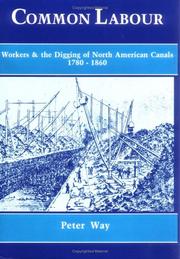| Listing 1 - 4 of 4 |
Sort by
|
Book
ISBN: 2829004698 9782829004698 Year: 2014 Publisher: Lausanne: Éditions d'en-bas,
Abstract | Keywords | Export | Availability | Bookmark
 Loading...
Loading...Choose an application
- Reference Manager
- EndNote
- RefWorks (Direct export to RefWorks)
Un jeune ingénieur neuchâtelois, Henri Étienne (1862-1927), est engagé par la Compagnie créée par Ferdinand de Lesseps pour le percement du canal de Panama. Il devra surveiller les commandes de machines. Après avoir fait ses preuves aux États-Unis, il se voit confier une mission secrète : recruter des ouvriers chinois pour creuser le canal. Les lettres qu'il envoie à sa famille entre 1886 et 1889 racontent à demi-mot cette entreprise clandestine ; elles l'aident à faire comprendre aux siens le monde qu'il parcourt en mer et sur terre.
Engineers --- Chinese --- Canal construction workers --- Etienne, Henri --- Panama Canal (Panama)

ISBN: 3932147189 Year: 2000 Publisher: Osnabrück Rasch
Abstract | Keywords | Export | Availability | Bookmark
 Loading...
Loading...Choose an application
- Reference Manager
- EndNote
- RefWorks (Direct export to RefWorks)
Canal construction workers --- Canals --- Foreign workers, Dutch --- History

ISBN: 0511583893 051109857X 0521440335 0521102650 Year: 1993 Publisher: Cambridge : Cambridge University Press,
Abstract | Keywords | Export | Availability | Bookmark
 Loading...
Loading...Choose an application
- Reference Manager
- EndNote
- RefWorks (Direct export to RefWorks)
This study of canal construction workers between 1780 and 1860 challenges labour history's focus on skilled craftsmen and the model of working-class culture it generated. Canallers, part of the mass of unskilled labour thrown up by industrial capitalism, had an experience that differed in many ways from artisans. Once on the labour market, they were wholly alienated, more fully exploited, worse off economically and socially fragmented. Their struggle as members of a class pivoted on material conditions not on skill and shop-floor control. Canal construction played a significant role in the rise of industrial capitalism by opening new markets, providing an army of workers and initiating the state-capital ties so important in later years. Increasingly dominated by Irish immigrants the workforce lived in shanty towns at the work site or in nearby cities, the setting for much vice and violence. These were not the vibrant working-class communities of later labour history and the situation deteriorated in the late 1830s as labour surplus caused massive unemployment and depressed wages. The history of canal workers traces another strand of the labour story, one where the absence of skills bred powerlessness that made common labour's engagement with capital markedly unequal.
Canal construction workers --- Canals --- Channels (Hydraulic engineering) --- Hydraulic structures --- Inland navigation --- Canal diggers --- Canal workers --- Construction workers --- History. --- Arts and Humanities --- History
Book
ISBN: 9780520960374 0520960378 0520284593 0520284607 9780520284593 9780520284609 Year: 2016 Publisher: Oakland, California
Abstract | Keywords | Export | Availability | Bookmark
 Loading...
Loading...Choose an application
- Reference Manager
- EndNote
- RefWorks (Direct export to RefWorks)
"In America's historical imagination, toil and triumph against nature and overwhelming odds characterizes such achievements as the Erie Canal and the transcontinental railroad. Triumph transformed canal and railroad entrepreneurs into visionaries whose work brought the nation bountiful riches and did the Lord's bidding. Celebrated for their spirit and perseverance in 'building' the nation's infrastructure, they found respect for looking to tomorrow and creating a future. For generations, most indexes of American history supported and reinforced this narrative of progress. Yet, if this is the historical memory, it is conveniently stunted. What of those whose bodies strained and broke under the load of such glories? What of those men beyond the din and fanfare who only appear in old photographs with faces blurred and indistinguishable? In their lives and deaths in the mud, muck, and mountains is another history of American achievement. These barely visible and forgotten, ordinary men, 'unskilled' immigrants from Ireland and China, Mormons, and native-born American workingmen rank, as well, as the creators of national growth and progress. Their experiences and voices, along with those of the privileged and well-connected, are the subjects of this study. I examine the rise of Western canals and railroads to national prominence through the menial labor of countless men, largely hidden from view because they left virtually no paper trail, who strung together livelihoods at the economic fringes of society. This book examines the contest for control of American progress and history as distilled from the competing narratives of canal and railroad construction workers and those fortunate enough to avoid this fate"--Provided by publisher.
E-books --- Canal construction workers --- Railroad construction workers --- Foreign workers --- Canals --- Railroads --- History --- Channels (Hydraulic engineering) --- Hydraulic structures --- Inland navigation --- Alien labor --- Aliens --- Foreign labor --- Guest workers --- Guestworkers --- Immigrant labor --- Immigrant workers --- Migrant labor (Foreign workers) --- Migrant workers (Foreign workers) --- Employees --- Railroad workers --- Construction workers --- Canal diggers --- Canal workers --- History. --- Employment --- Noncitizen labor --- Noncitizens --- Canal construction workers -- United States -- History. --- Canals -- United States -- History. --- Foreign workers -- United States -- History. --- Railroad construction workers -- United States -- History. --- Railroads -- United States -- History. --- 19th century american history. --- 19th century american immigrants. --- american empire. --- american history. --- american west. --- canals. --- capitalism. --- central pacific railroad. --- chinese. --- construction workers. --- continental empire. --- cultural studies. --- erie canal. --- history. --- immigrants. --- immigration. --- irish. --- labor studies. --- labor. --- mormons. --- narrative of progress. --- national infrastructure. --- rail travel. --- railroads. --- suffering. --- survival. --- technology. --- union pacific railroad. --- united states of america. --- westward expansion. --- workers rights. --- workers.
| Listing 1 - 4 of 4 |
Sort by
|

 Search
Search Feedback
Feedback About UniCat
About UniCat  Help
Help News
News